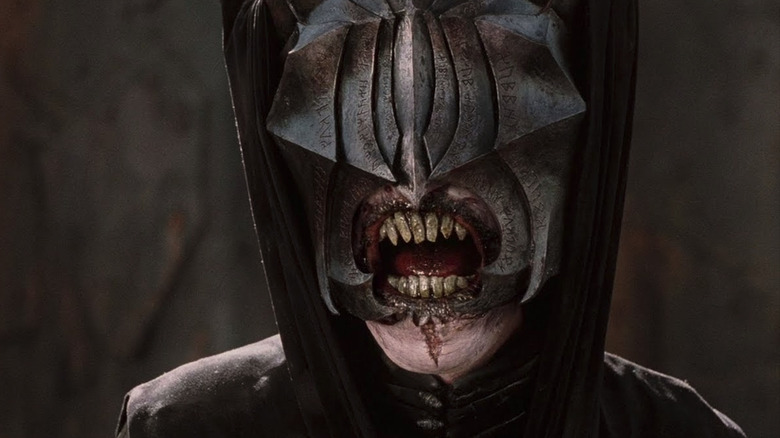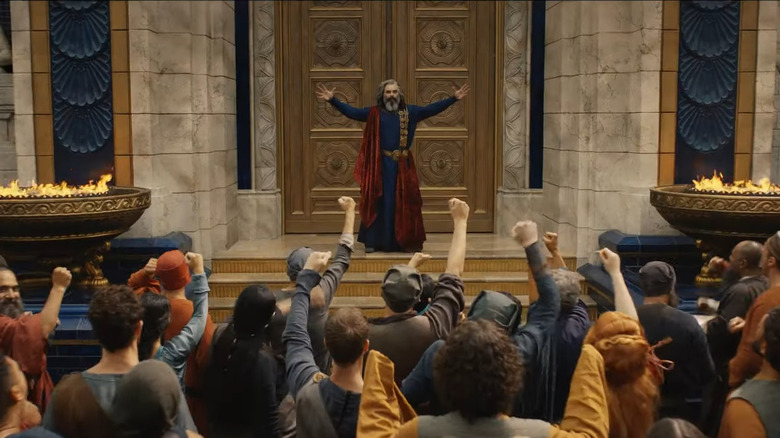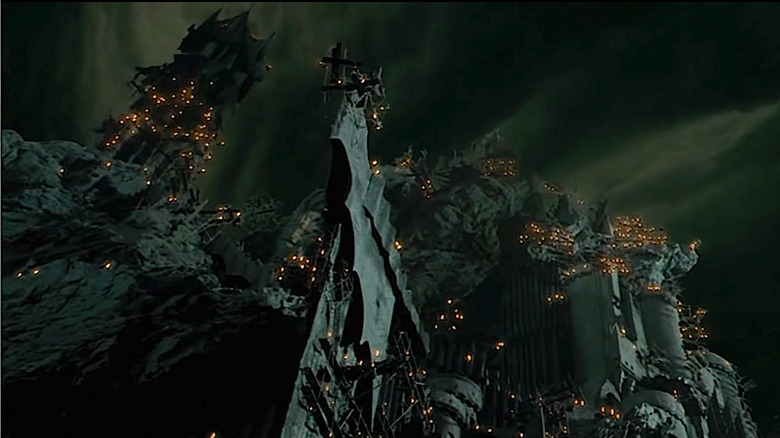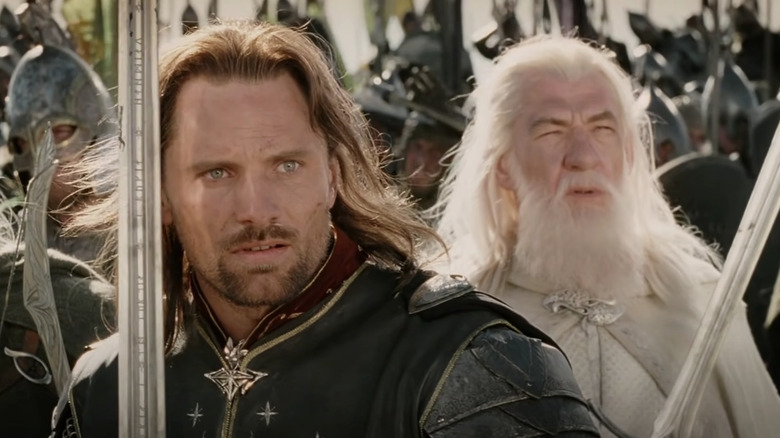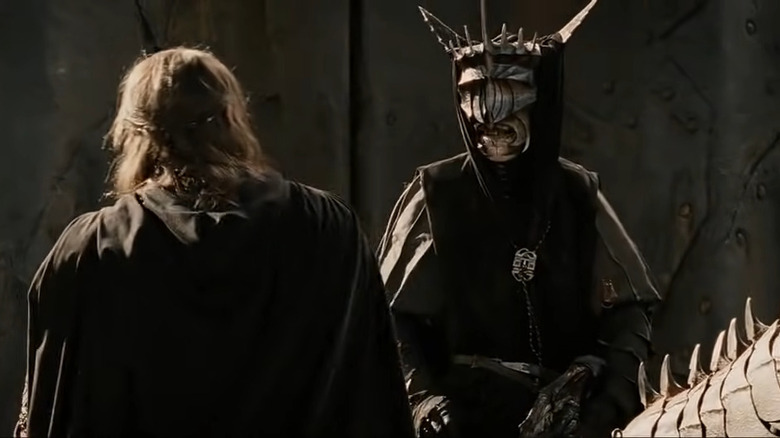Lord Of The Rings: What Is The Mouth Of Sauron & Who Plays The Character?
"The Return of the King" movie is an action-packed epic from start to finish. It has moving speeches, terrifying sieges, dangerous duels, and thunderous charges. One of the best parts of the nearly three-and-a-half-hour film is its climactic sequence, in which Aragorn leads a tiny army against the Black Gates of Mordor as a diversion to help Frodo reach Mount Doom and destroy the One Ring.
In the theatrical version, Aragorn gives one of the best battlefield speeches of all time, and then they get right down to business. In the extended edition, there's a brief prelude in which a strange character rides out from the gates. This personality is called "The Mouth of Sauron," and he's played by Kiwi actor Bruce Spence. Spence has also appeared as similar minor characters in other major films, including the "Pirates of the Caribbean," "Star Wars," and "Chronicles of Narnia" universes. In Peter Jackson's film, the Mouth of Sauron holds a brief diplomatic meeting with the invading leaders before Aragorn lops his head off and charges at Sauron's troops anyway. (This is a dishonorable act against a diplomat that Tolkien's version of Aragorn would never do, by the way.)
The brief appearance of the Mouth of Sauron character is a fun, albeit inaccurate, teaser for book fans. He doesn't change the story much, so it makes sense why Peter Jackson cut the scene — the same way he axed a potential duel between Aragorn and Sauron in front of the Black Gate. For those who haven't read the books, though, the short-lived character leads to a lot of questions. Who is he? Why is he there? What race is he? Let's dig into the backstory of the Mouth of Sauron.
The Mouth of Sauron's mysteriously dark origins
Technically speaking, the origins of "The Mouth of Sauron" are unknown. In fact, apart from his subservient title, we know next to nothing about the man behind the mask. However, we do know that he is indeed a Man, which is something, especially in a world full of Dwarves, Hobbits, Orcs, and Elves.
Tolkien also gives us a brief description of what Sauron's human representative looks like in "The Return of the King" book. In that volume, it says that in response to a challenge from Aragorn and his companions, a group of Sauron's servants ride out from the Black Gate. The text starts by stating, "At its head there rode a tall and evil shape," before going on to add that this individual "was robed all in black, and black was his lofty helm; yet this was no Ringwraith but a living man. The Lieutenant of the Tower of Barad-dûr he was, and his name is remembered in no tale; for he himself had forgotten it, and he said: 'I am the Mouth of Sauron.'"
This disturbing introduction is a fascinating glimpse into the inner workings of Mordor. Throughout "The Lord of the Rings," we get little snippets of how Sauron's world works, but these are usually seen through his lesser servants or far away from Mordor. The reference to the "Lieutenant of the Tower of Barad-dûr" is a big deal. Barad-dûr is Sauron's primary fortress (the one that collapses when the One Ring is destroyed), which puts the Mouth of Sauron in a very important role at the top of the Mordor food chain. The fact that the Man has forgotten his name also reflects the all-or-nothing nature that comes with serving the Dark Lord.
The Mouth of Sauron likely comes from the Black Númenoréans
There may not be too many factual specifics about the Mouth of Sauron's origin, but Tolkien gives us the equivalent of a third-hand summary in the book. "But it is told that he was a renegade, who came of the race of those that are named the Black Númenóreans; for they established their dwellings in Middle-earth during the years of Sauron's domination, and they worshipped him, being enamoured of evil knowledge."
The Black Númenóreans are descended from the same race that Aragorn's ancestors came from, both groups originally hailing from the island nation of Númenor. This operates as one of Sauron's primary enemy nations during the Second Age — when Amazon Studios's "The Rings of Power" story is set. While the physical island of Númenor eventually disappears in an Atlantian-style apocalypse, its people leave colonies and settlements all along the western shoreline of Middle-earth (that's the left side of the Middle-earth map). Those in Gondor and above it are Aragorn's ancestors. They're the good guys who resist Sauron.
Those below Gondor turn to evil and get the nickname of the Black Númenóreans. They flock to Sauron's banner and serve him over the years, and they're still kicking around when the War of the Ring starts a few thousand years later. In fact, the Black Ships that invade Gondor (and are also shown briefly during the extended edition of "The Return of the King") are manned by descendants of the Black Númenóreans.
The Mouth of Sauron climbs the corporate ladder
In the text that describes the confrontation in front of the Black Gates, Tolkien goes on to explain how the Mouth of Sauron achieved such a high status in Mordor in the years leading up to the War of the Ring, saying, "And he entered the service of the Dark Tower when it first rose again, and because of his cunning he grew ever higher in the Lord's favour; and he learned great sorcery, and knew much of the mind of Sauron; and he was more cruel than any orc."
When it says that the Mouth of Sauron signed up to work for Sauron when the Dark Tower "first rose again," it's roughly referencing the second building of Sauron's fortress. (The original is destroyed thousands of years earlier when the One Ring is cut from his hand.) In the appendices of "The Return of the King," it says that this event happens 2951 years into the Third Age, adding that in that year, "Sauron declares himself openly and gathers power in Mordor. He begins the rebuilding of Barad-dûr." This is roughly 68 years before his showdown with Aragorn.
Once onboarded into team Sauron, the man proceeds to forget his name and embark on a remarkable career path in the Land of Shadow. He learns to be a sorcerer, develops a penchant for cruelty, and buddies up with the Dark Lord himself. His influence is so strong that, in the books, it's revealed that if Sauron wins, the Mouth of Sauron would be the one to take the place of the defunct Wizard Saruman in Isengard. That's right, this is the guy who would operate as Sauron's deputy over that entire region.
The Mouth of Sauron scene is a much longer confrontation in the books
The part of the story with the Mouth of Sauron is much longer in Tolkien's original writings. There is an extended conversation in which the two sides debate over terms, identify Aragorn's importance as the heir to the throne of Gondor, and discuss the discovery of Frodo near Shelob's lair. They even haggle over the potential of Aragorn's army giving up without a fight before Gandalf puts the kibosh on the concept of a willing surrender.
Critically, when everything ends, there is no beheading. Aragorn doesn't even draw his sword. Yes, this sounds less dramatic, but trust us, this is a good thing. The two groups are having a diplomatic meeting — which is a classic immunity scenario for all parties involved. Instead of growing impatient and channeling that frustration into a desire to start slicing, Aragorn does something that is subtly much more badass. After the Mouth of Sauron criticizes Aragorn's legitimacy as king, we get an interesting line that reads, "Aragorn said naught in answer, but he took the other's eye and held it, and for a moment they strove thus; but soon, though Aragorn did not stir nor move hand to weapon, the other quailed and gave back as if menaced with a blow." The spiritual implications of this "inner battle" are awe-inspiring and much better for Aragorn's stock in that moment. Unfortunately, though, blinking contests don't translate well to the silver screen, so Peter Jackson opted for a hasty decapitation instead.
The Mouth of Sauron ultimately flees right into obscurity
When the negotiations end, Gandalf angrily demands for the Mouth of Sauron to depart. At that point, the text says, "Then the Messenger of Mordor laughed no more. His face was twisted with amazement and anger to the likeness of some wild beast that, as it crouches on its prey, is smitten on the muzzle with a stinging rod. Rage filled him and his mouth slavered, and shapeless sounds of fury came strangling from his throat."
As he stands in front of Gandalf, Aragorn, and company, the Mouth of Sauron makes his final decision in the story. He decides to flee (with his head still intact). The text ends by saying, "But he looked at the fell faces of the Captains and their deadly eyes, and fear overcame his wrath. He gave a great cry, and turned, leaped upon his steed, and with his company galloped madly back to Cirith Gorgor." It's a cowardly ending for one of Sauron's top commanders. Whatever happens to him in the ensuing defeat is unknown. In fact, we never see him again.
